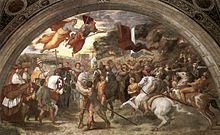452
Appearance
| Millennium: | 1st millennium |
|---|---|
| Centuries: | |
| Decades: | |
| Years: |
| 452 by topic |
|---|
| Leaders |
| Categories |
| Gregorian calendar | 452 CDLII |
| Ab urbe condita | 1205 |
| Assyrian calendar | 5202 |
| Balinese saka calendar | 373–374 |
| Bengali calendar | −141 |
| Berber calendar | 1402 |
| Buddhist calendar | 996 |
| Burmese calendar | −186 |
| Byzantine calendar | 5960–5961 |
| Chinese calendar | 辛卯年 (Metal Rabbit) 3149 or 2942 — to — 壬辰年 (Water Dragon) 3150 or 2943 |
| Coptic calendar | 168–169 |
| Discordian calendar | 1618 |
| Ethiopian calendar | 444–445 |
| Hebrew calendar | 4212–4213 |
| Hindu calendars | |
| - Vikram Samvat | 508–509 |
| - Shaka Samvat | 373–374 |
| - Kali Yuga | 3552–3553 |
| Holocene calendar | 10452 |
| Iranian calendar | 170 BP – 169 BP |
| Islamic calendar | 175 BH – 174 BH |
| Javanese calendar | 337–338 |
| Julian calendar | 452 CDLII |
| Korean calendar | 2785 |
| Minguo calendar | 1460 before ROC 民前1460年 |
| Nanakshahi calendar | −1016 |
| Seleucid era | 763/764 AG |
| Thai solar calendar | 994–995 |
| Tibetan calendar | 阴金兔年 (female Iron-Rabbit) 578 or 197 or −575 — to — 阳水龙年 (male Water-Dragon) 579 or 198 or −574 |

Year 452 (CDLII) was a leap year starting on Tuesday (link will display the full calendar) of the Julian calendar. At the time, it was known as the Year of the Consulship of Herculanus and Sporacius (or, less frequently, year 1205 Ab urbe condita). The denomination 452 for this year has been used since the early medieval period, when the Anno Domini calendar era became the prevalent method in Europe for naming years.
Events
By place
Roman Empire
- The Huns under Attila invade Northern Italy. Emperor Valentinian III flees from Ravenna to Rome, and sends Pope Leo I to persuade him to return to the Hungarian Plain. The cities of Aquileia, Padua and Verona are destroyed by the Huns. Milan is saved because Attila is offered a huge amount of gold. Flavius Aetius (magister militum) is unable to raise a new army against him.
- Rome is threatened by Attila but not attacked, due to a last-minute effort by Leo I. Strengthened by news of reinforcements from the Eastern Roman Empire and the plague breaking out among the Huns, Attila is persuaded to withdraw.
- The city of Venice is founded by fugitives from Attila's army. They flee to small islands in the Venetian Lagoon.
Britannia
- King Vortigern marries Hengist's daughter, Rowena, and becomes king of the Britons. The Anglo-Saxons increase their settlements in Britain (according to British legend).
China
- Nan'an Yinwang succeeds his father Tai Wu Di, after he is assassinated by the eunuch Zong Ai. Later that year, Yinwang is murdered as well, and Ai is overthrown by a group of high officials. Wen Cheng Di, age 12, becomes the new emperor of Northern Wei.
Births
- Gundobad, king of the Burgundians (approximate date)
- John the Silent, bishop and saint (d. 558)
- Qi Mingdi, emperor of Southern Qi (d. 498)
- Wang Jian, official of Liu Song and Southern Qi (d. 489)
- Yu Zhong, official and regent of Northern Wei (d. 518)
Deaths
- March 11 – Tai Wu Di, emperor of Northern Wei (b. 408)
- Drest I, king of the Picts (approximate date)
- Nan'an Yinwang, emperor of Northern Wei
- Yujiulü, consort and wife of Tuoba Huang
- Zong Ai, eunuch and high official
